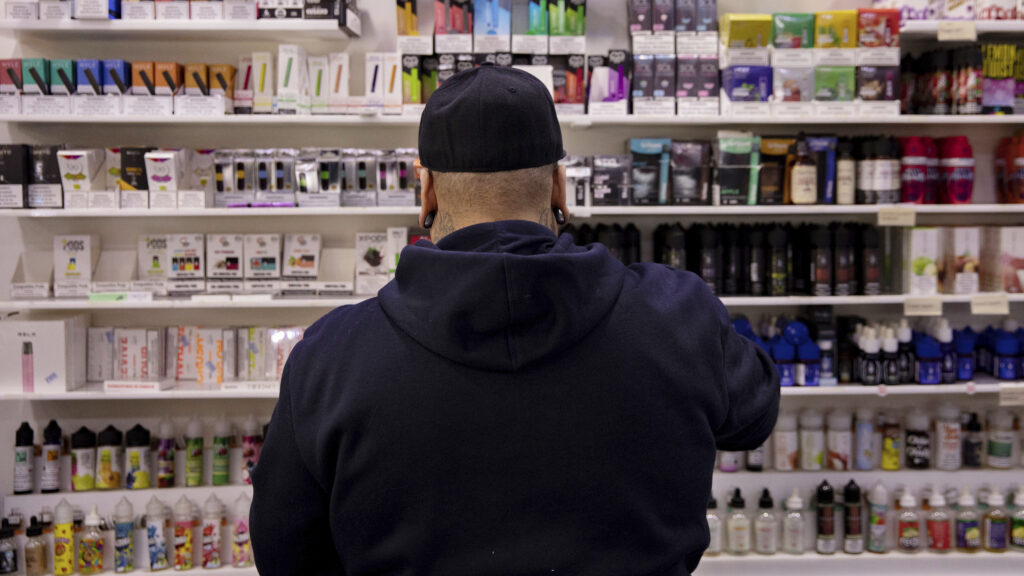WASHINGTON – Powerful House lawmakers from both parties are skeptical of the Food and Drug Administration’s pitch to start collecting fees from e-cigarette companies, similar to how the agency assesses them on tobacco firms.
FDA officials say that the fees, which e-cigarette companies would pay when filing applications with the agency, would give regulators resources to tackle the thousands of illegal vapes lining store shelves. However, lawmakers on the House Energy & Commerce Committee questioned Tuesday whether the FDA’s Center for Tobacco Products, which has struggled for years to police the vaping industry, has shown itself capable of effectively using those funds.
advertisement
“I’m the biggest advocate for more resources and more authority, but it’s hard to make that case if we don’t see some progress,” said New Jersey Rep. Frank Pallone, the top Democrat on the committee.
Pallone added that while he hopes e-cigarette user fees would “make a difference,” he was skeptical of whether the FDA would be able to rein in the illegal vape market. “I hate to say it but you just make it seem hopeless to me.”
Rep. Larry Bucshon (R-Ind.), the vice chair of the Energy & Commerce Health Subcommittee, added that he supports “revisiting tobacco user fees … but I think maybe we need some additional accountability from the agency.”
advertisement
The situation presents a Catch-22 for the agency. While certain lawmakers want to see the FDA dramatically increase its enforcement against illegal e-cigarettes before giving the agency more money, the FDA says it needs that money to increase its enforcement.
The FDA’s tobacco center currently collects user fees from cigarette and cigar companies, but it needs Congress’ go-ahead before collecting user fees from e-cigarette makers. The agency has been pitching Congress on that fix, which regulators estimate would add roughly $114 million to the tobacco center’s more than $700 million budget, 50% of which would go to ramping up enforcement.
Tuesday’s hearing, which focused on “Evaluating FDA Human Foods and Tobacco Programs,” was House lawmakers’ first chance to question both Brian King, the head of the FDA tobacco center and Jim Jones, who leads the FDA’s food work. King joined the agency in July 2022. Jones joined last September.
While one House lawmaker, Rep. Jennifer McClellan (D-Va.) has introduced legislation to start the e-cigarette user fee program, it does not currently have any co-sponsors. The legislation would also need to pass the narrowly divided Senate, which has similarly expressed frustration with the FDA’s approach toward these products.
King tried to convince lawmakers Tuesday that the agency has taken serious action against vape companies selling illegal products, including fining retailers, seizing products at the border, and filing injunctions against manufacturers in federal courts. However, lawmakers on both sides of the aisle questioned whether the agency was doing enough.
“Honestly, I don’t see [progress] in my neighborhoods,” said Rep. Michael Burgess (R-Texas), who also questioned the benefit of tobacco user fees. “I see vape shops literally on every street corner.”
Regulators’ pitch for more funding is also likely to be complicated by several Republicans’ anger at the agency for its conservative approach toward approving new e-cigarettes, which are seen as a less harmful alternative for adult smokers. The FDA has, to date, authorized just 34 products, despite receiving more than 26 million applications. The FDA considers each individual product submitted by a manufacturer to be its own application, including individual flavored e-liquids mixed by mom and pop vape shops.
advertisement
Republicans on the Energy & Commerce Committee also expressed concern with the FDA’s approach to enforcement of e-cigarette laws, which has largely focused on targeting small vape shops that sell illegal products.
“If you have limited resources, I would focus those resources on the bigger actors, you don’t have the time to go to every mom-and-pop in America,” said Rep. Richard Hudson (R-N.C.). “But if you focus on who are the major importers and distributors of these illegal products … I think we will have a lot more success.”
While King pitched that 50% of the new user fees would go toward ramping up enforcement, he did not detail Tuesday exactly how that money would be used.
He also cautioned that the FDA will be unable to swiftly pull vapes off of store shelves around the country, even with additional resources.
“That would require thousands and thousands of individual seizures that would then result in thousands and thousands of cases in federal district courts across the country, which would be untenable,” King said.
STAT’s coverage of chronic health issues is supported by a grant from Bloomberg Philanthropies. Our financial supporters are not involved in any decisions about our journalism.

